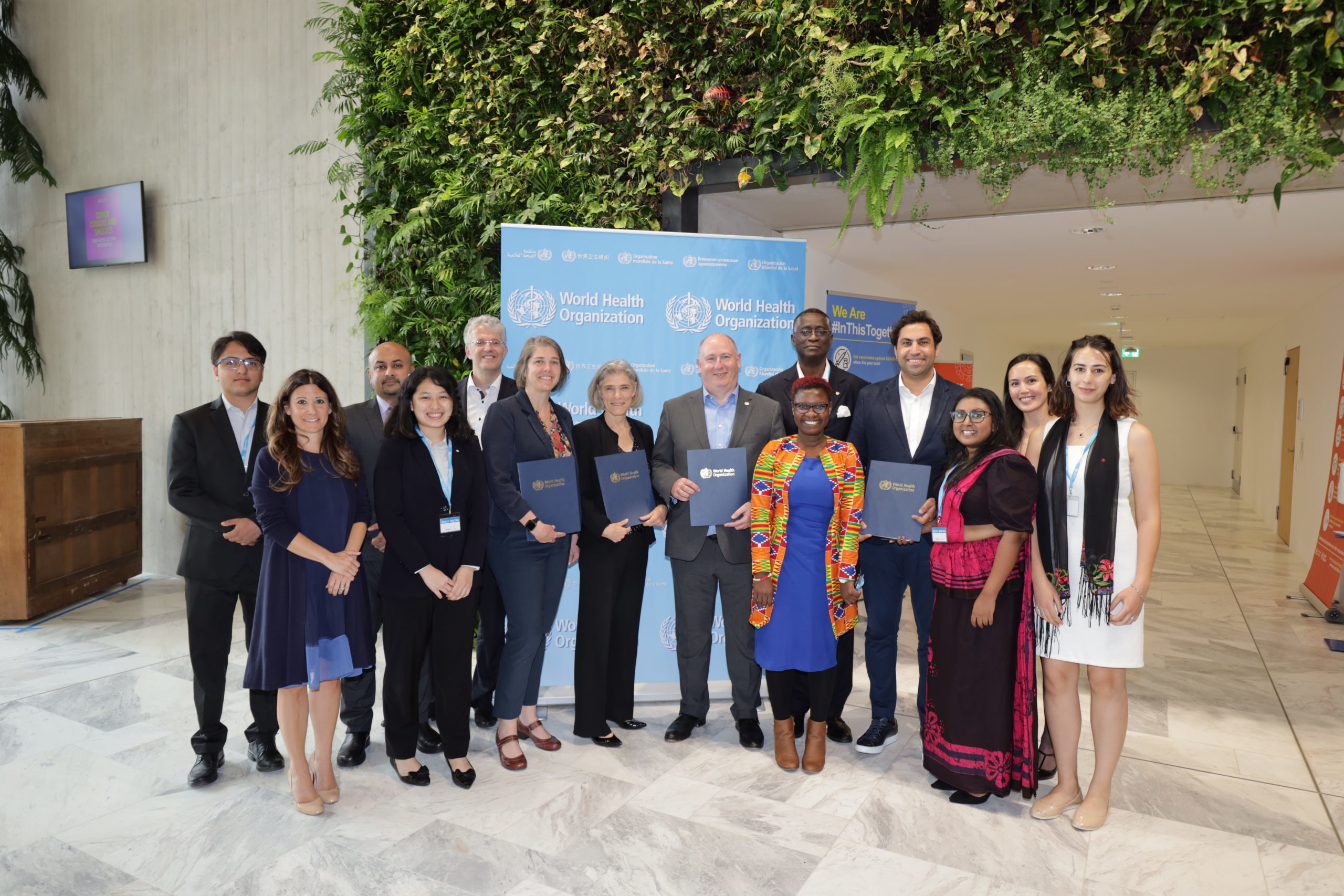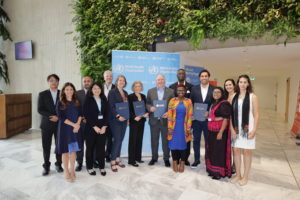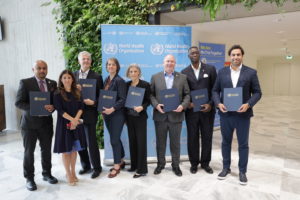
Big Six agree new strategic collaboration with the WHO
WORLD’S LARGEST YOUTH ORGANISATIONS AGREE NEW STRATEGIC COLLABORATION WITH THE WHO TO BUILD A HEALTHIER, MORE EQUAL AND YOUTH-LED FUTURE
Today CEOs and youth leaders from the Big Six Youth Organizations met with leaders from the World Health Organization (WHO) to discuss the role of young people in leading COVID-19 response and recovery efforts and agree on a ground-breaking strategic partnership and collaboration of engaging young people in future health related crises.
The partnership agreements signed by five of the Big Six are designed to increase multilateral collaboration and put young people at the heart of decision making, whilst the IFRC will use its existing partnership to achieve this goal. This represents an important milestone in the successful collaboration between the Big Six, the WHO, and the Global Youth Mobilization (GYM), a movement of young people taking action to address the negative impact of the COVID-19 pandemic, and to build back better.
Young people today face an unparalleled time of challenge. In addition to the direct health impacts exacerbated by the pandemic, young people continue to be disproportionately affected by disruptions to education, loss or lack of employment opportunities, domestic and gender-based violence, and mental health challenges.
The new strategic agreements build on the Global Youth Mobilization, a successful initiative launched at the end of 2020 and supported by WHO and the UN Foundation through the COVID-19 Solidarity Response Fund. The Global Youth Mobilization enables the rapid disbursement of micro grants to tens of thousands of young people worldwide to help develop solutions to ensure their communities emerge from the pandemic stronger than before. Through the “Local Solutions”, young people are driving change and implementing solutions in response to COVID-19 by taking action through community-based interventions and voluntary services. The initiative is powering change at a national level too through the engagement and activation of Big Six national organizations across the world.
The collaboration between WHO and the Big Six Youth Organizations includes a focus on the areas of mental and physical health, health promotion, sexual and reproductive health and rights, and climate and health.
Commenting on the strategic collaboration, Dr Tedros Adhanom Ghebreyesus, WHO Director-General, said:
“WHO is proud to support the global movement to engage and empower young people as a driving force in the recovery from the COVID-19 pandemic. Working with the Big 6 and the United Nations Foundation has provided a unique opportunity to learn from millions of young people and be guided by their enthusiasm and ideas to help communities build back better,”
He added: “What the Big Six have achieved in a year through launching and implementing the Global Youth Mobilization is phenomenal and unparalleled in the youth development sector. We look forward to continuing our work with the Global Youth Mobilization and each of the Big Six member organizations directly and encourage others to invest in the Global Youth Mobilization and the Big 6 to promote the health and well-being of future generations.”
Anna Segall, CEO of the World Association of Girl Guides and Girl Scouts and Chair of the Global Youth Mobilization, said:
“We believe in young people’s agency and know that with the right support and opportunity they can imagine and lead the solutions to the global challenges we face today.
In coming together through the Global Youth Mobilization, the Big Six Youth Organisations have shown that by listening to young people and providing them with the space and resources to act, our organisations and young people can make a huge collective impact.
We look forward to continuing this vital work through our new strategic collaboration with the World Health Organization. By supporting young people to improve their mental and physical health, sexual and reproductive health and rights and tackle the impact of climate change we can work together to create a better, fairer future for all.”
Meti Gemechu, Youth Board Representative for the Global Youth Mobilization and World Young Women’s Christian Association, said:
“Through the Global Youth Mobilisation, we have proved that we are not the problem but in fact the solution to not just building back from the pandemic but building back better. With innovation, relentless energy and dedication to bettering our communities young people have led the response and recovery efforts. The Global Youth Mobilization is a critical actor in bringing together everyone for a future we want to be a part of.”
During the three-day visit the Big Six shared highlights and recommendations with multinational agencies, institutions, governments, policymakers and corporations to prioritise the needs of young people from the Global Youth Mobilization “Powering Change: Young People Leading the COVID-19 Response and Recovery” impact report. To date the Global Youth Mobilization has already resulted in 200,000 young people actively engaged in addressing the consequences of the COVID-19 pandemic in their local communities. They have been at the forefront of the pandemic recovery, delivering over 260 projects to date in 77 countries and supporting 800,000 community beneficiaries.
ENDS
Note to Editors
About the Global Youth Mobilization and Big Six Youth Organisations
The Global Youth Mobilization (GYM), launched in December 2020, is a movement of young people taking action to improve their lives and their communities now and in a post-COVID-19 world.
Powered by the Big Six – (Young Men’s Christian Association, YMCA; World Young Women’s Christian Association, YWCA; World Organization of the Scout Movement; World Association of Girl Guides and Girl Scouts; International Federation of Red Cross and Red Crescent Societies, IFRC; and The Duke of Edinburgh’s International Award), which together actively have a reach of 250 million young people worldwide– and supported by the World Health Organization and the United Nations Foundation, GYM aims to harness this momentum to address the negative impact of the pandemic on young people and support them to build back better.
With support from the COVID-19 Solidarity Response Fund, Global Youth Mobilization is supporting and scaling-up youth-led solutions, reinventing funding models and re-energising youth engagement programmes across the world.


Read the full “Powering Change: Young People Leading the COVID-19 Response and Recovery,” report, the summary report and the policy recommendations visit – https://globalyouthmobilization.org/impact/
Examples of National Projects and Local Solutions case studies
“Youth United Against COVID-19” – Malawi
By effectively mobilising more than 1000 young women and indigenous community members in rural and peri-urban Malawi, the project aims to reduce the spread of COVID-19 and address the impacts it has had on young women in 2 YWCA centres in Likhubula and Mulanje.
The project will include young girls who dropped out of school to marry or become mothers due the pandemic, as well as young women (and women) who have experienced GBV, especially rape or defilement. It seeks to address the mental health concerns of these young people through the provision and innovation of psycho-social services, led by young people on the ground, building the capacity and resilience skills of this particularly vulnerable group.
By engaging local governance structures and organisations using multiple community outreach techniques, young people will work with local duty bearers and effectively demand essential hygiene & sanitation materials for schools and markets, with the aim that at least 65 percent of community members adhere to COVID-19 prevention measures (i.e. wearing masks and social distancing) in public areas. This project is funded by the Global Youth Mobilization in collaboration with World YWCA.
Youth we 3erve – Hong Kong
The Hong Kong Mental Health Conference 2020 found that the pandemic has resulted in increased anxiety, stress and depression among more than 50% of young people in Hong Kong. To help alleviate these symptoms The Hong Kong Award for Young People is working with The Scout Association of Hong Kong and the Hong Kong Girl Guides Association on a twelve-month long ‘Youth Mental Health Ambassador Programme’.
A total of 21 participants take part in the programme, from each of the three organisations (seven from each organisation). The programme consists of three phases with over 1300 hours of community services and activities included. Participants first receive mental health training in how to talk and support people, and then go out into their communities to provide services to 300 other local young people.
The aim of the project is for the Youth Mental Health Ambassador twofold. Firstly, to help their fellow young people to process any negative emotions that may have arisen from the COVID-19 pandemic, and secondly to transfer their own negative emotions into positive action by serving others and sharing their stories.
Scouting for Balance – Poland
The Polish Scouting and Guiding Association has implemented a project to combat the psychological and effects of the pandemic by building psychological support for young people. Supported by a team of psychologists and educators, the project aims to address the needs of their participants through workshops in their local communities.
Under the name “Scouting for balance”, with the support of the World Association of Girls Guides and Girl Scouts (WAGGGS) and funded by the Global Youth Mobilization, project leads have provided workshops to train 100 young girls, women and men on the skills necessary to build on an provide psychological support to their wider networks.
Through this training participants will have higher confidence in openness and awareness when working in the field to highlight the importance and benefits of mental health in their communities. This youth-led initiative was further supported by the development of a “Psychological First Aid Kit” to be used by members to address the needs of their constituents.
The Karsa Project – Indonesia
The project was created by and for young people to empower them and to address pandemic prevention, protection and provide access to vaccinations, by opening a free clinic to provide care packages and daily support to patrons in Tangerang. At the clinic patients have access to glucose and uric acid blood tests, free medical check-ups and consultations. Patients are also provided with medication and immune boosting vitamins and swab testing for COVID-19. Additionally, visitors are further provided with food, hygiene packages and prevention materials such as masks and hand sanitizer.
The young people behind the Karsa Project, who are an average of 17 years old, believe that mental health is a priority for overall wellbeing. They often discuss mental health benefits with community members and make frequent visits to rehabilitation centres and mental health clinics to provide additional support to patients.
The Karsa Project is a great example of the positive impact that young people taking leadership roles in their communities can have.
COVID-19 Education and Prevention, Vaccine Confidence and Uptake – Nigeria
Through the “Increasing COVID-19 Education and Prevention, Vaccine Confidence and Uptake” project, the Inspire World International Foundation (IWIF) aims to train and build the technical capacity of young people for advocacy and public education to promote the dissemination of informed messaging on COVID-19 and vaccines. Additionally, the project is further supported by an education pandemic information digital campaign and outreach materials in Igbo, Yoruba and Hausa languages to reduce language barriers to COVID-19 education.
IWIF has hosted 23 vaccination outreach and sensitization training programmes at schools and community centres in rural and urban communities in Abuja. These outreach programmes are facilitated by 20 community influencers, comprised of community leaders, social media influencers, religious leaders and teachers, who have trained to become Global Youth Mobilizers through the projects’ COVID-19 Ambassador Training Programme. To date the outreach reach programme has encouraged over 100 young people to receive the COVID-19 vaccinations and hope to reach 200 more by the project’s end.
Furthermore, through use of a digital educational campaign to address COVID-19 and vaccine myths through online platforms such as Facebook, Twitter, Instagram, YouTube, WhatsApp, and live webinars, IWIF aims to reach over 15 000 young people to improve their knowledge, confidence, and trust in COVID-19 vaccines.
For more information contact:
Sam Williams
Global Youth Mobilization, Project Co-Lead
Email: sam.williams@intaward.org
OR
Paleni Amulungu
Global Youth Mobilization, Digital Communications, Partnerships and Advocacy Coordinator
Email: paleni.amulungu@scout.org



